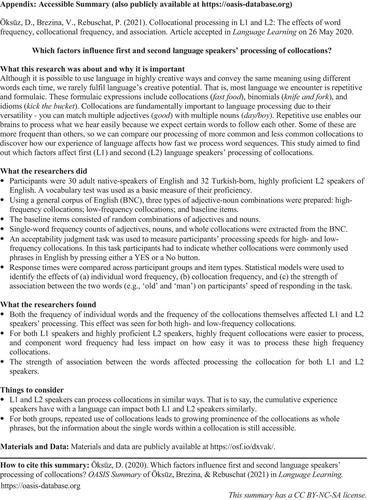当前位置:
X-MOL 学术
›
Lang. Learn.
›
论文详情
Our official English website, www.x-mol.net, welcomes your
feedback! (Note: you will need to create a separate account there.)
Collocational Processing in L1 and L2: The Effects of Word Frequency, Collocational Frequency, and Association
Language Learning ( IF 3.5 ) Pub Date : 2020-08-11 , DOI: 10.1111/lang.12427 Doğuş Öksüz 1, 2 , Vaclav Brezina 1 , Patrick Rebuschat 1, 3
Language Learning ( IF 3.5 ) Pub Date : 2020-08-11 , DOI: 10.1111/lang.12427 Doğuş Öksüz 1, 2 , Vaclav Brezina 1 , Patrick Rebuschat 1, 3
Affiliation

|
This study investigated the effects of individual word frequency, collocational frequency and association on L1 and L2 collocational processing. An acceptability judgment task was administered to L1 and L2 speakers of English. Response times were analysed using mixed- effects modelling for three types of adjective-noun pairs: (1) high-frequency, (2) low-frequency and (3) baseline items. This study extends previous research by examining if the effects of individual word and collocation frequency counts differ for L1 and L2 speakers’ processing of collocations. This study also compared to what extent L1 and L2 speakers’ response times are affected by mutual information and log dice scores, which are corpus-derived association measures. Both groups of participants demonstrated sensitivity to both individual word and collocation frequency counts. However, there was a reduced effects of individual word frequency counts for processing high-frequency collocations compared to low-frequency collocations. Both groups of participants were similarly sensitive to the association measures used.
中文翻译:

L1 和 L2 中的搭配处理:词频、搭配频率和联想的影响
本研究调查了单个词频、搭配频率和联想对 L1 和 L2 搭配加工的影响。对英语为 L1 和 L2 的人进行了可接受性判断任务。使用混合效应模型对三种类型的形容词-名词对分析响应时间:(1) 高频,(2) 低频和 (3) 基线项目。本研究通过检查单个单词和搭配频率计数对 L1 和 L2 说话者处理搭配的影响是否不同,从而扩展了先前的研究。本研究还比较了 L1 和 L2 说话者的响应时间受互信息和对数骰子分数影响的程度,这些分数是语料库衍生的关联度量。两组参与者都表现出对单个单词和搭配频率计数的敏感性。然而,与低频搭配相比,单个词频计数对处理高频搭配的影响有所降低。两组参与者对所使用的关联测量都同样敏感。
更新日期:2020-08-11
中文翻译:

L1 和 L2 中的搭配处理:词频、搭配频率和联想的影响
本研究调查了单个词频、搭配频率和联想对 L1 和 L2 搭配加工的影响。对英语为 L1 和 L2 的人进行了可接受性判断任务。使用混合效应模型对三种类型的形容词-名词对分析响应时间:(1) 高频,(2) 低频和 (3) 基线项目。本研究通过检查单个单词和搭配频率计数对 L1 和 L2 说话者处理搭配的影响是否不同,从而扩展了先前的研究。本研究还比较了 L1 和 L2 说话者的响应时间受互信息和对数骰子分数影响的程度,这些分数是语料库衍生的关联度量。两组参与者都表现出对单个单词和搭配频率计数的敏感性。然而,与低频搭配相比,单个词频计数对处理高频搭配的影响有所降低。两组参与者对所使用的关联测量都同样敏感。











































 京公网安备 11010802027423号
京公网安备 11010802027423号